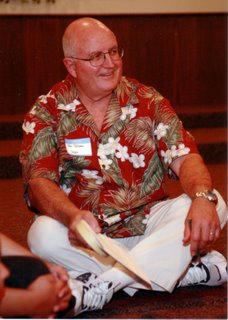Lessons from a Man Who Has Been There and Done That (IV)
 A Sense of Loss
A Sense of LossThe late John Leith has performed a most necessary service in his book Crisis in the Church.[1] Not merely does he chronicle his pilgrimage from the Left-wing to the Right-wing in the Presbyterian Church USA, but he simultaneously issues a warning both to seminary faculties as well as congregations to insure that they remain biblically sound and theologically astute. By way of association, this is also a warning for the modern Christian as well.
In our last installment we touched briefly on his lament over the loss of tradition as a sign of the beginning of the end in both seminary and local congregation. I find this more than relevant because there is simply so much nonsense in the modern Church today, both in its mega-church as well as in its Emergent Church varieties. It is becoming next to impossible to go to any reputable Christian web or blog site and not find yet another incident of the ridiculous, obscene, or absurd concerning what is called “modern evangelicalism.”
Even though the mega-church proponents are still culpable, it seems more and more that the contemporary culprits are the leaders and congregations that comprise the Emergent Church Movement. Brian “The Birkenstock” McLaren has what seems to be a terminal case of “Foot-in-Mouth” disease. Hardly a day goes by that he doesn’t take a shot at traditional Christianity. His “lieutenants,” who march in lock step, quickly follow suit. With each passing day certitude about anything, especially Christian truth, is leaving the building and doctrines that form the heart/core of biblical truth are called into question.
Of course, this really is nothing new. Anyone vaguely acquainted with the history of the Christian Church knows that controversy and contention have been the hallmarks of the Church throughout the centuries. Satan and his minions are always stirring up trouble and dissent. Both the mega-church and EC movement are more than sufficient cause for us to pay close attention to Leith’s warnings.
He observes a connection between the loss of tradition and the loss of gratitude. He writes, “Loss of tradition leads to loss of gratitude. Those who do not remember cannot be thankful for all that is bequeathed to them.”[2] Remembering is key, essential. For those who have not re-read Allan Bloom’s The Closing of the American Mind recently might have forgotten his sagacious words that it is quite difficult to convince modern students of the importance of anything that happened prior to 1970.[3] In modern Church circles, Bloom’s observation is true in spades, especially when it comes to classical Christian writers. And, of course, one of the reasons errors and heresies rear their ugly heads periodically is precisely because many modern Christians have not taken the time to find out what those errors and heresies were. So there is some justification in the dictum that those who do not know them might be destined to repeat them.
The largesse that was bequeathed to us by the Church Fathers is rich and glorious. Yet, those professors and pastors who do not lead their students and congregations into this rich heritage are, according to Leith, guilty of cannibalism. When we lived in Holland—or maybe it was The Netherlands. I’m not certain anymore—I was amazed at the “gap” that existed between the mindset of the older generation that had experienced the ravages of World War II and the younger generation that had not. What is more, the younger generation was not being taught the truth of WW II. The politically correct movement was already making its inroads. (By the way, just as an aside, few seem to have picked up on what Dinesh D’Souza wrote in his work Illiberal Education about the words “politically correct” being a relatively obscure term from Marxist theory.)
Analogous to the Middle Ages, ignorance allows church leadership to eat the “lambs” alive. You can tell them almost anything and they’ll believe you. Truly, all that is needed is ignorance of the fundamental truths of Scripture combined with personal peace and affluence and you have a recipe for spiritual disaster—which is what modern evangelicalism is. Leith contends that “The cannibalization of congregations by people, including ministers who did not build them, is a serious problem in contemporary church life.”[4] In a slightly different context, David Wells aptly calls such ministers “modern disablers.”
As the modern Church has turned away from classical Christian literature and sound biblical preaching, their respective congregations have developed what the Authorized Version of 1901 calls “leanness of soul” (cf. Ps. 106:15). Many modern believers are, at best, one-dimensional Christians (God is love) and possess precious little biblical truth. The mega-church movement is partly to blame, the Emergent Church Movement is certainly playing its role, and the general malaise and disinterest in Scripture by the generation known as “whatever-zippy-title-we’ll-given-them-this-time” is appalling. If you think I’m kidding, walk into almost any Christian bookstore (a misnomer) and try to find a substantial Christian book. Even if you succeed in finding one, the ratio of trinkets, mugs, “precious moments” figurines, CDs, and “relevant” material is overwhelmingly in favor of Christian "junk" instead of substance.
A case in point: I recently (out of laziness. It was the closest one) went to a local Christian bookstore and bought two marriage Bibles for ceremonies I was going to perform. As I was checking out, the trainee asked me where I went to church. I told her Grace Presbyterian Church and that we had a dynamic, good looking, relevant, and humorous pastor, who at one point in his life had lived in either Holland or The Netherlands. I wasn’t sure anymore. She didn’t get it. She went on to explain that her pastor, Sylvia, was also relevant. Changing the subject quickly I pointed out to her that as I was choosing the Bibles that I could not help but notice that on the Samsung 61-inch TV Rob Bell was playing. I asked her and the manager, who was standing close by if they had any idea what Bell thought about Scripture or homosexuality. The manager replied No, but assured me that all the young people and their parents thought he was really good. I also pointed out that in their “Relevancy” section—that’s funny. No, I mean really funny!—they had all of Brian “The Birkenstock” McLaren’s books. I asked if either of them had any idea what McLaren taught about penal substitutionary atonement. Blank stares. One of the customers hit me with her Ryrie Study Bible because—as she said—I should not swear or mention body parts in a Christian bookstore. That’s not true. I made that part up, but the blank stares were real.
When I explained what penal substitutionary atonement was, both of them droned, “Oh, my. That’s not good.” My reply was that it wasn’t only not good, but that McLaren’s view actually struck at the very heart of the gospel. More blank stares. McLaren’s books and Bell’s DVDs are still there. That is not atypical.
All of this comes, of course, with a very expensive spiritual price tag. The absence of memory on seminary faculties, on the part of pastors, and on the part of modern Christians is not merely a question of “doing church” or being entertained but also of morality. There is an ethical component that cannot, must not be neglected or denied. A very large part of the problem is secularization and a feeble, nebulous attempt to “engage the culture.” As often as not in modern Christianity “engaging the culture” means little more that showing film clips from R-rated movies, blaring raucous music during the “service,” manifest your “transparency” by using foul language or telling your deepest, darkest sin, playing pool at an upscale, trendy Southern California gourmet, designer pool hall, or knowing the names of a couple of classical composers or contemporary artists.
When I was in Holland, I was privileged to learn from those who had not only done it, but done it well, when to engage the culture and when to butt heads with it (called antithesis). We must engage the culture, but we must be biblically circumspect in how we go about it. Rick Lints rightly observes, “Evangelical theology must not only engage a culture that is largely resistant to its claims of absolute truth but must also recognize the influence which that culture has exercised upon it.”[5] That is to say, there is a certain “reciprocity” when we go out to engage the culture and if we are not aware of the talons that the culture bears every time we “engage” it we’re going to get clawed. In fact, the modern Church arguably has claw marks all over it and it’s not getting any smarter, but rather continues to rush headlong back into those bared claws.Once you have tossed the classical Christian tradition for modern, “faddish” writing, your gratitude-factor will diminish accordingly and then you are “fair game,” prey for the contextualization that culture demands. And those who do not know how to engage it not only endanger themselves, but dupe and endanger their congregations in the process. In our next issue we’ll see how all of this affects the loss of a sense of direction in the Church.
[1] John H. Leith, Crisis in the Church. The Plight of Theological Education, (Louisville, Westminster John Knox Press, 1997).
[2] Ibid., 15. Italics mine.
[3] Allan Bloom, The Closing of the American Mind: Education and the Crisis of Reason, (NY: Simon & Schuster, 1987).
[4] Leith, CiC, 15.
[5] Richard Lints, The Fabric of Theology, (Grand Rapids: Eerdmans, 1993), p. 26.





